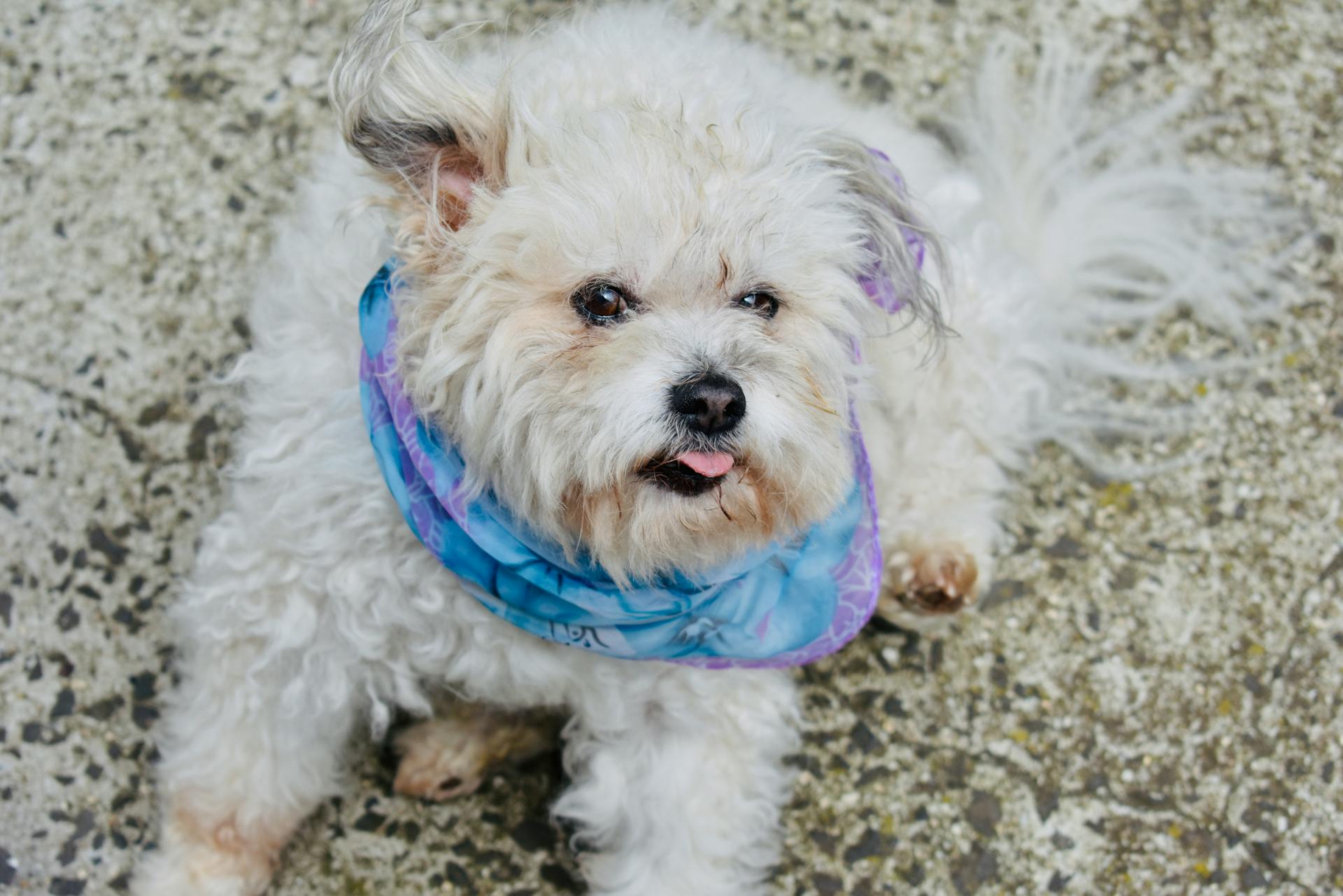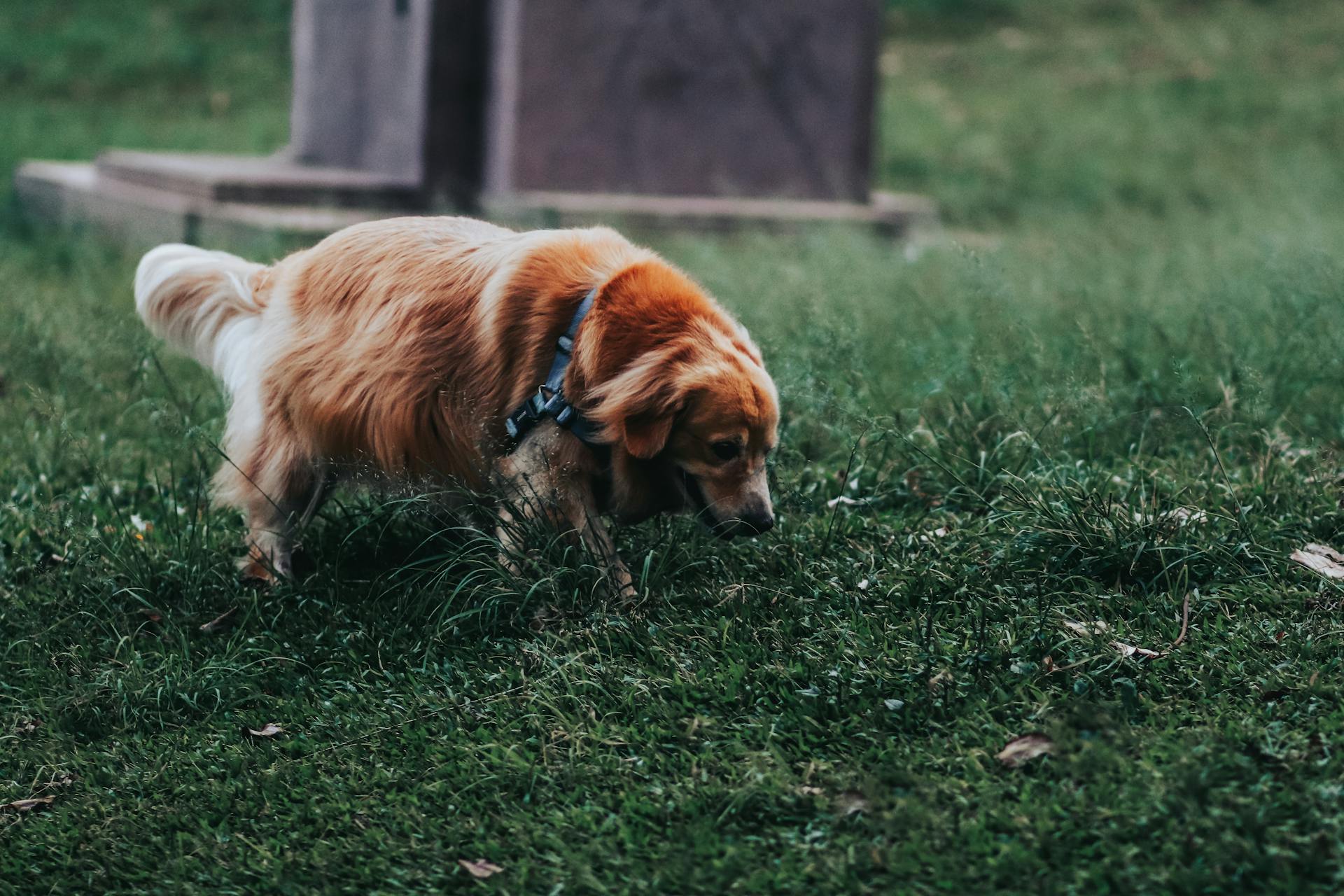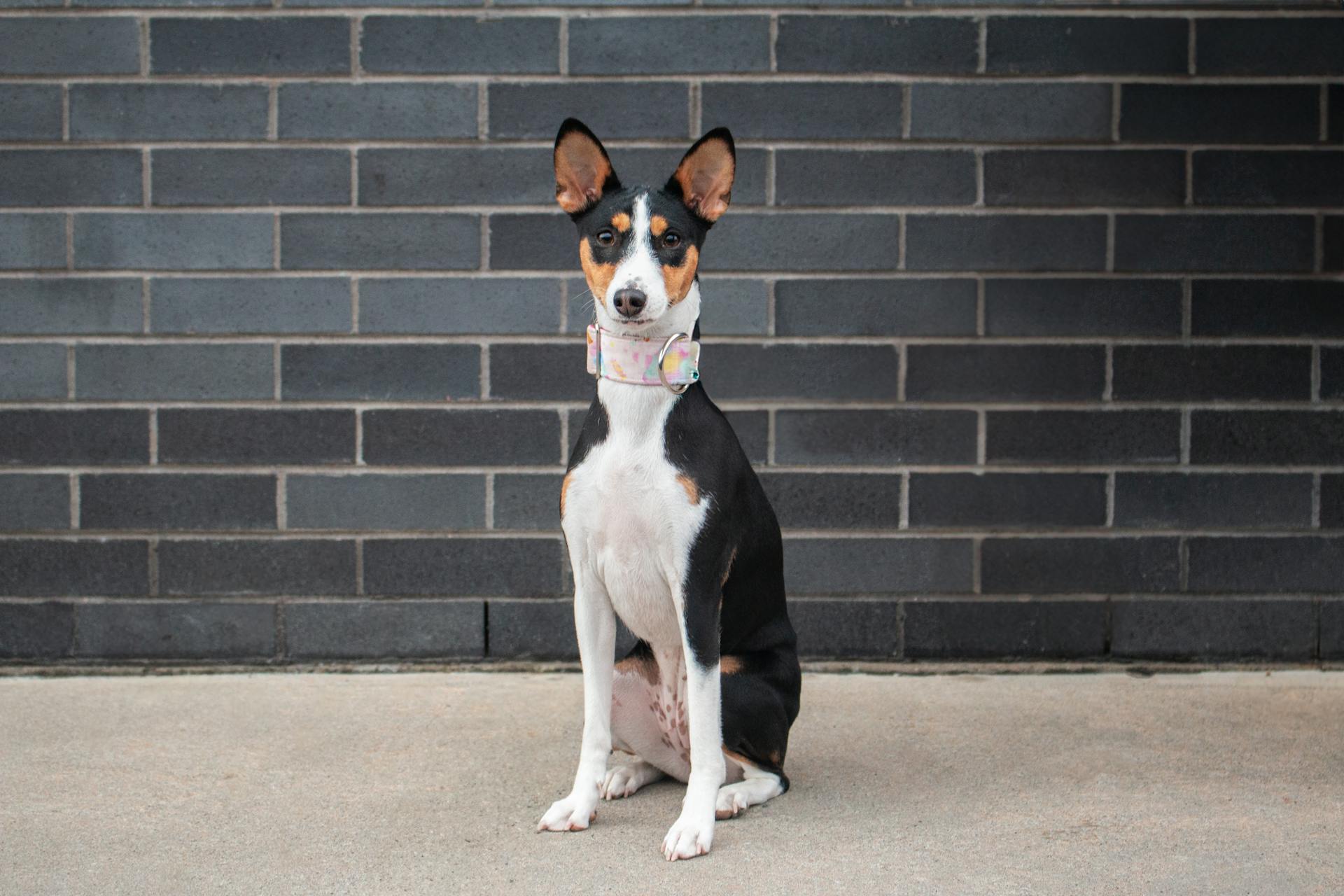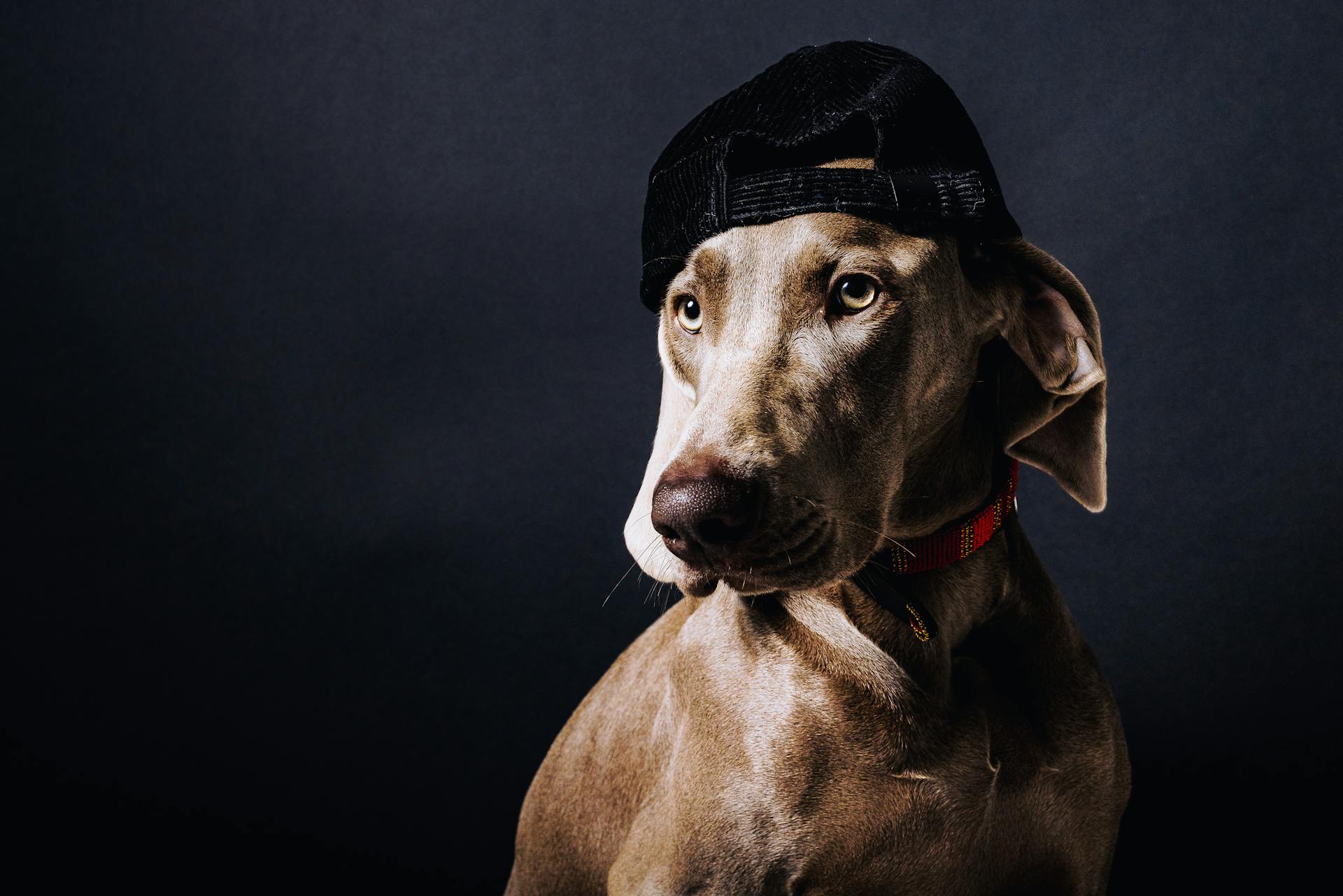
Maltese dogs are known for their sweet and gentle nature, but they can also be prone to certain behavior problems. They can be sensitive to noise and stress, which can lead to barking and whining.
One common issue with Maltese dogs is separation anxiety. According to studies, up to 50% of Maltese dogs suffer from separation anxiety, which can cause destructive behavior when left alone.
To address this issue, it's essential to establish a consistent routine and provide plenty of exercise and mental stimulation. This can help reduce anxiety and prevent destructive behavior.
Maltese dogs are also highly social animals and require regular interaction with their human family. They thrive on attention and affection, which can help strengthen the bond between dog and owner.
Understanding Maltese Behavior
Maltese dogs communicate through various body language cues, such as tail position, ear movement, facial expressions, and posture. Learning to recognize these signals can help you better understand your dog's emotions and needs.
A relaxed Maltese will have a loose, wiggly body, soft eyes, and a wagging tail. This is a clear sign that your dog is content and happy. On the other hand, a fearful Maltese might tuck its tail between its legs, lower its body, pin its ears back, and avoid eye contact.
Here are some common body language signals to look out for:
- Relaxed body: A loose, wiggly body, soft eyes, and a wagging tail.
- Alert or excited: Ears perked up, tail held high, and body leaning forward.
- Fearful: Tail tucked between legs, body lowered, ears pinned back, and avoiding eye contact.
- Aggressive: Raised hackles, bared teeth, growling, lunging, or snapping.
It's essential to remember that genetics alone do not determine a dog's temperament; other factors, such as socialization, environment, and health, also play a significant role.
Genetics and Temperament
The Maltese breed is generally friendly and affectionate, but individual dogs may inherit certain traits from their parents, such as a predisposition to aggression.
Genetics alone do not determine a dog's temperament, and other factors like socialization, environment, and health also play a significant role.
A Maltese's temperament is shaped by a combination of genetic and environmental factors, which means that proper socialization and care can help mitigate any inherited traits.
While some Maltese may be more prone to aggression due to genetics, this doesn't mean it's inevitable, and with the right upbringing, they can grow into well-adjusted and loving companions.
Check this out: Personality Traits of Husky Dogs
Understanding Body Language
Understanding your Maltese's body language is key to building a strong bond with your furry friend. By recognizing the different signals they send, you can respond in a way that meets their needs and prevents aggressive behavior.
A relaxed Maltese will have a loose, wiggly body, soft eyes, and a wagging tail. This is a great sign that your dog is happy and content.
If your Maltese is alert or excited, you might notice their ears perked up, tail held high, and body leaning forward. This can indicate curiosity or excitement, but it can also be a precursor to aggression if they feel threatened.
A fearful Maltese will tuck its tail between its legs, lower its body, pin its ears back, and avoid eye contact. This is a clear sign that your dog is feeling scared or anxious.
Here are some key body language cues to look out for:
- Relaxed body: loose, wiggly body, soft eyes, wagging tail
- Alert or excited: ears perked up, tail held high, body leaning forward
- Fearful: tail tucked between legs, body lowered, ears pinned back, avoiding eye contact
- Aggressive: raised hackles, bared teeth, growling, lunging, or snapping
By paying attention to these body language cues, you can respond in a way that meets your Maltese's needs and helps them feel safe and happy.
Training and Socialization
Proper socialization is crucial for Maltese dogs to develop confidence and reduce fear-based aggression. Exposing your dog to various people, animals, and environments from an early age can make a big difference.
A dog's environment and upbringing can significantly influence its behavior. Maltese dogs raised in a loving, nurturing environment with consistent training are less likely to exhibit aggressive tendencies.
Early and consistent socialization can help prevent aggression in Maltese dogs. It's essential to expose your puppy to various people, animals, and environments to help them develop confidence and reduce fear-based aggression.
To prevent aggression, it's essential to establish trust with your Maltese. A dog that feels secure in its relationship with its owner is less likely to display aggressive behavior.
Here are some tips for establishing trust with your Maltese:
- Provide a safe, comfortable environment for your Maltese, ensuring they have a designated space to call their own.
- Spend quality time with your dog daily, engaging in activities they enjoy, such as playtime, walks, or cuddling.
- Be patient and consistent in your training methods, using positive reinforcement to encourage desired behaviors.
- Build a routine that your Maltese can rely on, including regular feeding times, exercise, and grooming sessions.
- Approach new situations gradually, allowing your Maltese to adjust and feel comfortable at their own pace.
Proper training can also help prevent aggression in Maltese dogs. By breaking down complex behaviors into individual steps, you can help your dog develop self-control and reduce overexcitement.
Managing Behavior Problems
Managing behavior problems in your Maltese requires a regular daily routine with sufficient reward training, exercise, and social enrichment to prevent destructive behaviors like chewing, stealing, and digging.
Adequate outlets for exploratory play, such as chews, food-stuffed toys, or manipulation toys, can help redirect your dog's energy and reduce destructive behavior.
Some Maltese dogs may engage in destructive behaviors due to anxiety, such as separation anxiety or confinement, which can be diagnosed with the help of videotaping or camera monitoring.
Resource Guarding
Resource guarding is a common behavior problem in dogs, where they become possessive of certain objects or resources, such as food, toys, or even sleeping places. This behavior can be triggered by various factors, including genetics, early experience, and the value of the object to the dog.
One way to identify the triggers of resource guarding in your Maltese is to observe their behavior closely and take note of which resources they guard and under what circumstances. Common triggers include the presence of other dogs or pets, approach of family members, especially children, and sudden movements or loud noises near the guarded resource.
Here's an interesting read: Is Resource Guarding Dangerous
Desensitization and counter-conditioning are powerful techniques to help your Maltese overcome resource guarding. Desensitization involves gradually exposing your dog to the triggering situations, starting with low-intensity encounters and gradually increasing the intensity. Counter-conditioning, on the other hand, involves teaching your dog to associate the presence of the trigger with positive experiences.
To desensitize your Maltese, start by standing a considerable distance away while they eat, then gradually decrease the distance over time, rewarding your dog with praise or treats when they remain calm. This process helps your dog associate your presence near their food with positive outcomes, reducing their need to guard the resource.
Some common signs of resource guarding include growling, snarling, stiff body posture, and biting or snapping. If you notice any of these signs in your Maltese, it's essential to address the issue promptly to prevent it from escalating.
Here are some tips to help you manage resource guarding in your Maltese:
- Toss high-value treats near your Maltese's food bowl while they eat to help them associate your presence with positive outcomes.
- Offer a high-value treat or toy whenever your Maltese voluntarily gives up another toy or chew.
- Prevent access to items that may trigger resource guarding, such as food bowls, toys, and chews.
- Train your Maltese to give and drop on cue, starting with items of low value for high-value rewards.
If your Maltese's resource-guarding behavior is severe or doesn't improve with consistent training, it's crucial to consult a professional dog trainer or behaviorist. These experts can help identify the root cause of the issue and create a tailored training plan to address the problem effectively.
Destructive Behaviors
Many destructive behaviors, such as chewing, stealing, and digging, are normal exploratory behaviors that arise when the dog is unsupervised.
A regular daily routine with sufficient reward training, exercise, and social enrichment can help ensure these behaviors don't arise when owners are home.
Dogs may need varying degrees of supervision, and when they can't be supervised, they should be provided with adequate outlets for exploratory play.
Chews, food-stuffed toys, or manipulation toys can be great options, or outdoor dogs may need a designated area for digging.
Some dogs engage in destructive behaviors due to anxiety, such as separation anxiety or confinement anxiety.
Videotaping or camera monitoring is often the best way to diagnose behavior problems that occur when the owner is absent, as well as assess response to treatment.
House Soiling
House soiling is a common behavior problem in dogs. It's estimated that up to 25% of dogs will exhibit this behavior at some point.
Dogs may engage in house soiling due to medical issues, such as gastrointestinal problems or urinary tract infections. Medical conditions can cause dogs to associate certain areas of the house with relief.
Some dogs may also engage in house soiling due to anxiety or stress. Separation anxiety, for example, can cause dogs to become anxious and eliminate in the house.
House soiling can also be caused by a lack of proper housetraining. Dogs that are not consistently taken outside to relieve themselves may develop habits of eliminating in the house.
Consistency and patience are key when addressing house soiling behavior. Establishing a regular routine and rewarding good behavior can help to correct this problem.
Excitement and Overexcitement
Excitement can be a problem for dogs, leading to overexcitement in various situations. Clearly, guests arriving at the door is a top trigger for Coco.
It usually takes a dog 6 to 12 successful practices before they start staying behind the boundary and remaining calm on their own. This makes consistent training and practice crucial.
Breaking down the door opening into individual steps can help a dog like Coco keep a respectable distance and stay calm. This pause is a great mini dog obedience training and structural exercise.
Introducing a dog to social situations, such as playdates with other dogs, can help them develop their social skills and burn off excess energy.
Health Issues
Certain health issues can cause a Maltese dog to become aggressive, such as pain from dental problems or joint issues.
Regular veterinary check-ups can help detect and address any health concerns that may contribute to aggression in your Maltese dog.
Pain from dental problems can make a dog irritable and more likely to snap or bite.
If you suspect that your dog is acting aggressively due to pain or discomfort, consult your veterinarian for a thorough examination and appropriate treatment.
Dental disease, arthritis, trauma, and allergies can all lead to aggression in Maltese dogs.
You might enjoy: Dog Trainer for Aggression
Organ dysfunction, CNS disease, and endocrinopathies can also contribute to irritability and aggression in dogs.
Treating the medical problem may resolve the aggression, but the behavior, once learned, may persist.
You can talk to a vet online and get personalized advice for your pet at an affordable price through services like PangoVet.
Here's an interesting read: Dog to Dog Aggression
Seeking Professional Help
Seeking Professional Help is a crucial step in addressing aggression issues in your Maltese. Excessive or unprovoked aggression is a cause for concern and may require the expertise of a professional trainer or behaviorist.
Fear and anxiety can be common triggers for aggression in dogs, and addressing these underlying emotions is essential in resolving aggressive behavior. Persistent growling, snapping, or biting without clear provocation, displaying aggression towards family members or familiar pets, intense fear or anxiety leading to aggressive behavior, and escalating aggression in severity or frequency are all signs that your Maltese's aggression may require professional intervention.
Here's an interesting read: Female Dog Aggression after Spaying
A professional can help you identify the root cause of your Maltese's aggression and develop a tailored training plan to address it, providing ongoing support and guidance to help you navigate challenges and setbacks. They can also help manage aggressive behavior safely and effectively, reducing the risk of injury to you, your dog, or others, and achieve positive results in a shorter time frame compared to attempting to resolve aggression issues on your own.
Here are some signs that your Maltese's aggression may require professional intervention:
- Persistent growling, snapping, or biting without clear provocation
- Displaying aggression towards family members or familiar pets
- Intense fear or anxiety that leads to aggressive behavior
- Aggression that is escalating in severity or frequency
When to Seek Help
If you notice your dog growling, snapping, or biting without any clear reason, it's time to seek professional help. This behavior can be a sign of underlying issues that need to be addressed.
Fear and anxiety can trigger aggression in dogs, making them feel the need to defend themselves when threatened. Paying attention to your dog's body language and the context of their behavior is crucial in determining if professional help is needed.
If your Maltese displays aggression towards family members or familiar pets, it's a cause for concern. This behavior can be a sign of underlying issues that need to be addressed.
Signs that your dog's aggression may require professional intervention include:
- Persistent growling, snapping, or biting without clear provocation
- Displaying aggression towards family members or familiar pets
- Intense fear or anxiety that leads to aggressive behavior
- Aggression that is escalating in severity or frequency
If you notice any of these signs, it's essential to seek professional help to address the underlying issues and prevent further escalation of aggression.
Benefits of Working with a Professional
Working with a professional can make a huge difference in addressing your Maltese's aggression issues. A professional trainer or behaviorist can identify the root cause of your dog's aggression and develop a tailored training plan to address it.
With a professional on your side, you'll have ongoing support and guidance to help you navigate challenges and setbacks. They can provide you with the tools and expertise you need to overcome obstacles and stay on track.
Safety is a top priority when dealing with aggressive behavior, and a professional can help manage it safely and effectively. This reduces the risk of injury to you, your dog, or others.
By working with a professional, you can achieve positive results in a shorter time frame compared to attempting to resolve aggression issues on your own. With their experience and knowledge, they can help you get the best possible outcome for your dog.
Intriguing read: Dog Boarding Behavior Issues
Frequently Asked Questions
What are the cons of a Maltese dog?
Maltese dogs are not suitable for households with young children or boisterous pets due to their delicate nature and risk of injury. They require gentle handling and a safe environment to thrive
What age do Maltese calm down?
Maltese puppies typically calm down between 6-12 months of age, but their breed can significantly impact their energy levels and maturity rate.
Sources
- https://www.doggoneproblems.com/tashi_2/
- https://www.dogster.com/dog-breeds/how-aggressive-is-a-maltese
- https://iheartdogs.com/7-strategies-to-stop-your-malteses-resource-guarding/
- https://www.doggoneproblems.com/coco_maltese/
- https://www.merckvetmanual.com/behavior/normal-social-behavior-and-behavioral-problems-of-domestic-animals/behavioral-problems-of-dogs
Featured Images: pexels.com


